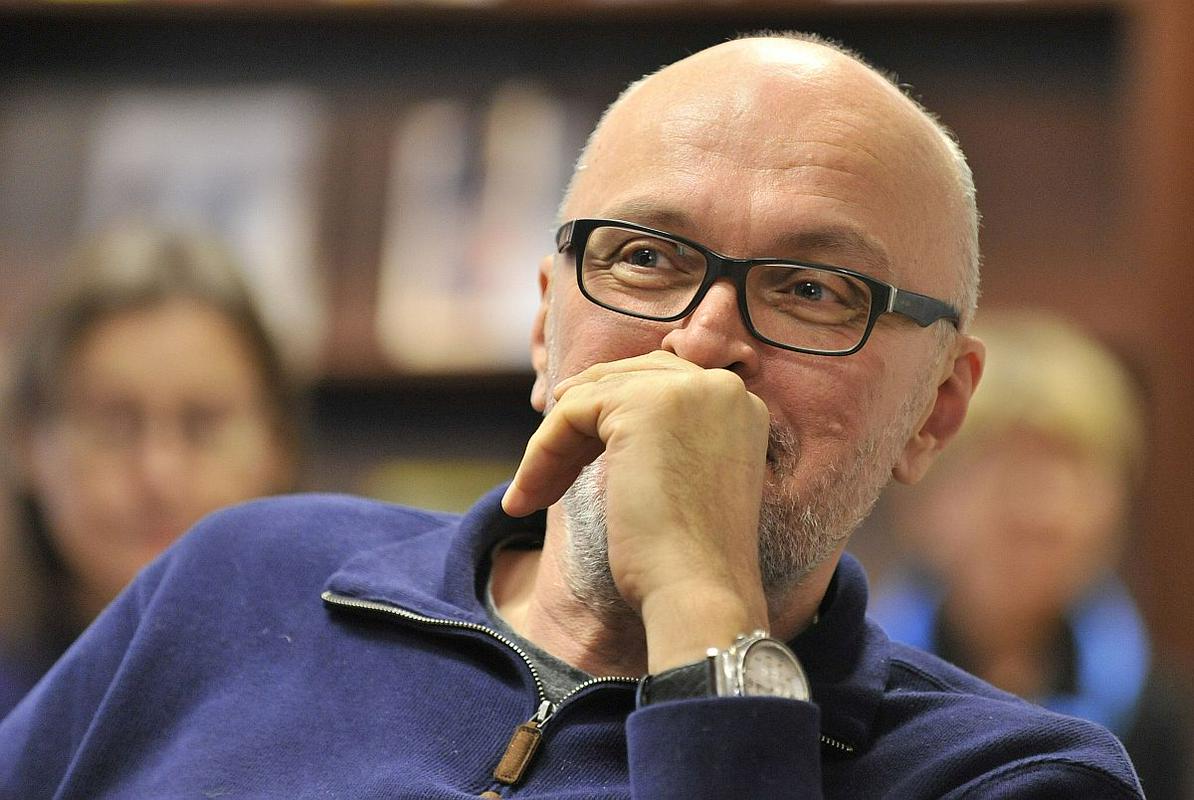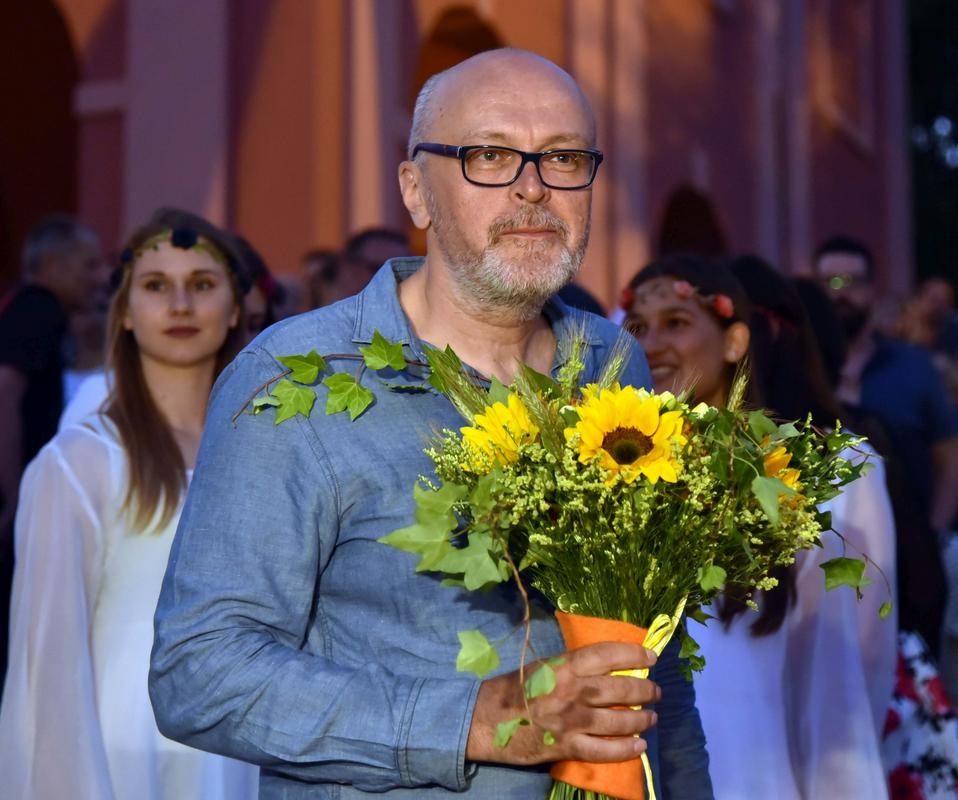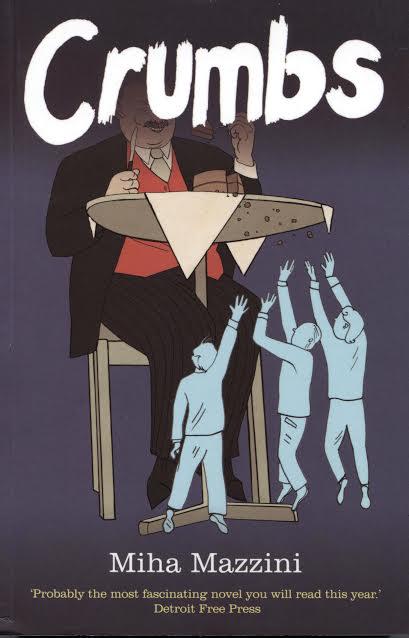
A nation will always come up with an archetype for a certain profession. The Slovenian stereotype of a writer is one of a fool, or a court jester, with an occasional drink problem. At the end of the 19th century, there were two prominent writers in the Slovenian territory, Ivan Tavčar, a boy from a province who grew up poor, went to Ljubljana, made a political career there and got rich, and Ivan Cankar, who took to drinking. So, we have two examples. The second one teaches us to be passive, to wait for others to take the responsibility, and to blame someone or something for whatever happens. We thought it appropriate to adopt this example.

My last book, Childhood, describes the first five years of my life. When I was getting ready to write the book, I had no idea how to do it. Finally, I took the events I remembered and turned them into stand-alone fictitious stories and used them as building bricks of an autobiographical novel about growing-up. Readers have to put the pieces together in their head.

A Slovenian writer wishing to stir international attention would have to combine two topics: the wars in the former Yugoslavia and the immigration into newly formed states in this territory. The two topics are on the top of the list for Americans. On the other hand, Slovenian readers prefer books with tragic content, books which enhance the feeling of passivity and helplessness. I am often criticised for not writing 'typical' Slovenian literature. Supposedly, my books are overly positive, and I too Americanised because I still believe that we can influence things and change them. I won’t apologise for that. Here, I’m totally on the side of Ivan Tavčar as an active protagonist.
You have three professions – you are a computer expert, a writer, and a screenwriter. Which do you like best?
All three. All my professions teach me something. In computer science I mostly learn structure and order. If you’re only a writer, your mind will soon start to wander, but if you also work as a software programmer, you must be down-to-earth. It’s much the same with film; the script is mainly about structure. We are all a mix of structure and intuition, with forms and meanings determined by our local culture.
Such as?
Well, it’s really interesting to compare literary performances in different countries. In the USA, these are stand-up events which include little reading but a lot of questions from the audience, and short and funny answers. It’s all about entertainment. Americans love entertainment more than anything. In England, literary events include readings by distinguished authors, well-read intellectuals, while in France the primary aim of a literary performance is to deliver a moral verdict in the style of Zola’s J’accuse. In France, literature readings have a strong tradition and are considered moral pillars of society. Questions like What do you think about the current war? are at the top of the list of commonly asked questions.
A nation will always come up with an archetype for a certain profession. The Slovenian stereotype of a writer is one of a fool, or a court jester, with an occasional drink problem. At the end of the 19th century, there were two prominent writers in the Slovenian territory, Ivan Tavčar, a boy from a province who grew up poor, went to Ljubljana, made a political career there and got rich, and Ivan Cankar, who took to drinking. So, we have two examples. The second one teaches us to be passive, to wait for others to take the responsibility, and to blame someone or something for whatever happens. We thought it appropriate to adopt this example.
Where did you learn to be a writer?
I've thought a lot about how a writer is made, and come to a conclusion that a certain genetic predisposition is required. Then other factors come into play. Curiosity, for example. It also helps if you are really bored as a child. Because when there's no fun to be found in the outside world, you turn inside. If you are constantly taken from one activity to another, you will have no reason to start exploring this inner world. Actually, most of us writers were brought up by grandparents. They had little time for us and this forced us to look inside. Another excellent practice for becoming a writer is to read as much as possible.
My last book, Childhood, describes the first five years of my life. When I was getting ready to write the book, I had no idea how to do it. Finally, I took the events I remembered and turned them into stand-alone fictitious stories and used them as building bricks of an autobiographical novel about growing-up. Readers have to put the pieces together in their head.
Was this a sort of a personal cleansing?
In a way, perhaps, although I don't believe in the therapeutic effects of literature. However, there are times in life when we need to go back to go forward...
.... forward to another film you will direct and have written the script for?
Yes, that's true. I'm delighted that we will start filming a feature movie about the "the Erased" in October. My long-time wish to direct and make this film is finally coming true. We're in the middle of preparations now. I'm really interested in hidden injustice. If there's a theme that I really relate to, this is it. It’s not just about "the Erased"; after all, Childhood is also a novel about an injustice. There were things that I couldn't say as a five-year-old, so I told them now, in this book.
You are best known among Slovenes for your brutally blunt and honest columns in which you expose the flaws of the nation.
These columns have made me a kind of celebrity. They are very widely read and popular. This part of my life is now over, though, because I don't want to turn into a moralising preacher to whom people come seeking atonement for their sins. It's like I'm making allowances for people and they count on me to rescue them. It doesn’t work for me anymore. Also, I'm not a big fan of routine and that's why I've changed so many professions in my life. The secret of a creative life is constantly taking on new challenges. For me, this is now film and literature, which is growing on me. Luckily, I have a permanent source of income and I don't need to write to qualify for a grant, status, or points; I can create freely.
In my columns, I addressed the quirks and oddities of our society, from Slovenian mentality to other contemporary social issues. By nature, Slovenians are serfs and career rebels always going against something. This fact alone gives plenty of food for thought and writing. Such attitude and traits are not surprising; they are typical of nations who were under foreign rule. Constant rebelling against authority or, more precisely, the structure and order that this authority imposes. Clearly, this is not very productive for the society or the individual. The question is – how to reach beyond? In principle, implementation of the rule of law would help. But what does it really mean? That the punishment is instantaneous and now, no negotiations, no leeway!
A democracy of responsibility and order, then.
Absolutely. Scots, for example, needed a few centuries of practice before they established real democracy. Science claims that it takes three generations to lose what has been transmitted through epigenetic inheritance. The Bible agrees, stating that three generations will suffer the consequences of sins. In short, no democracy can exist without responsibility. Paradoxically, if you want to have democracy, you will need to perfect the order and responsibility first.
Your columns also reflect extensive knowledge and understanding of the human psyche.
That's true. I've always been interested in that. I've studied the topic a lot and even written my PhD about it.
Miha Mazzini as a writer abroad.
In Slovenia books are published in small editions; 400 copies is quite a high number. Childhood has already sold in more than 1200 copies, which is a high number for the Slovenian market.
Only about 3% of all books published in the United States are works in translation, while in the UK this figure is 4%. My books are published abroad, but with minor publishers and in small editions. Nevertheless, writers in Slovenia actually live better than their colleagues in the States, probably because the countries operate completely different systems again reflecting the respective national mentalities. In the US, the system runs like a lottery: a low 1% of writers earn a lot of money, while others work mainly for free, or for really low fees. The middle class (and medium wages) is rapidly disappearing from the western world. In music, a total of 16 artists earn 70% of all the money. Everyone else is left to fight for the leftovers. On the other hand, Slovenia is an egalitarian society, which means that everyone will get a share, through small. In our system, I would receive the same payment as a novice writer because this practice is rooted in our mentality. That makes Slovenia much safer for writers; we all get something and no one is left out. Personally, I think the system is not very motivational, but it is safe for all the parties involved, in particular for those not on the hardworking side.
Creative industries fall under the Ministry of Culture in Slovenia, which makes no sense. They are economic activities. Let's take a look at Germany. I think it is wrong to treat culture like an orchid in a buttonhole, a relic that has nothing in common with ordinary life. For me, culture is an important part of the economy. Creative industries account for 30% of Berlin's GDP, which is great. I'd like to see this happen also in Slovenia.
What themes are most popular with international publishers?
They are interested in all wars across the globe, and immigration. A Slovenian writer wishing to stir international attention would have to combine two topics: the wars in the former Yugoslavia and the immigration into newly formed states in this territory. The two topics are on the top of the list for Americans. On the other hand, Slovenian readers prefer books with tragic content, books which enhance the feeling of passivity and helplessness. I am often criticised for not writing 'typical' Slovenian literature. Supposedly, my books are overly positive, and I too Americanised because I still believe that we can influence things and change them. I won’t apologise for that. Here, I’m totally on the side of Ivan Tavčar as an active protagonist.
A nation will always come up with an archetype for a certain profession. The Slovenian stereotype of a writer is one of a fool, or a court jester, with an occasional drink problem. At the end of the 19th century, there were two prominent writers in the Slovenian territory, Ivan Tavčar, a boy from a province who grew up poor, went to Ljubljana, made a political career there and got rich, and Ivan Cankar, who took to drinking. So, we have two examples. The second one teaches us to be passive, to wait for others to take the responsibility, and to blame someone or something for whatever happens. We thought it appropriate to adopt this example.
My last book, Childhood, describes the first five years of my life. When I was getting ready to write the book, I had no idea how to do it. Finally, I took the events I remembered and turned them into stand-alone fictitious stories and used them as building bricks of an autobiographical novel about growing-up. Readers have to put the pieces together in their head.
A Slovenian writer wishing to stir international attention would have to combine two topics: the wars in the former Yugoslavia and the immigration into newly formed states in this territory. The two topics are on the top of the list for Americans. On the other hand, Slovenian readers prefer books with tragic content, books which enhance the feeling of passivity and helplessness. I am often criticised for not writing 'typical' Slovenian literature. Supposedly, my books are overly positive, and I too Americanised because I still believe that we can influence things and change them. I won’t apologise for that. Here, I’m totally on the side of Ivan Tavčar as an active protagonist.

























































